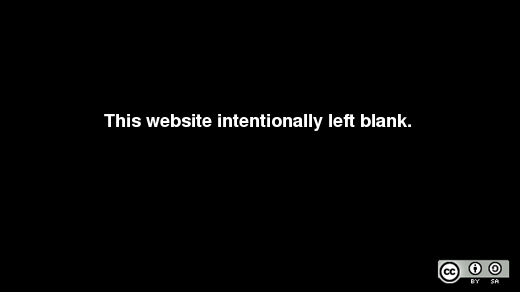Yesterday I posted screenshots of 127 websites that “blacked out” to protest the SOPA and PIPA legislation before the US Congress. Another site I came across reported that 7,000 sites had gone black. There was no citation, but I believe it if you include every blog that WordPress enabled to automatically go black and if you count all of those sites I posted screenshots of as “blacking out.”
I don’t.
That is not to say that the blackout had no effect (I’ll get to that in a minute). But the only site I know of that truly enacted what I would describe as a blackout is Reddit. Despite the many confused Wikipedia visitors (chronicled humorously by @herpderpedia), Wikipedia didn’t really black out. Not only did Wired and The New York Times give instructions early in the day on circumventing the blackout, Wikipedia did as well.
Most sites didn’t even go as far as Wikipedia’s more-or-less blackout. The most popular version seemed to be the Google version—black out your logo, or put up a splash screen that mentioned opposition to SOPA.
Nevertheless, the very visible protests did a few important things:
- Legitimately raised awareness
I often find that movements whose goal is to “raise awareness” exist for topics that most people are already well aware of. In this case, however, I was surprised to find out how many people whom I expected to be well-versed in the topic had not even heard of SOPA, much less PIPA. - Inspired action beyond passive objection
Many Congresspeople reported having their offices flooded with phone calls and emails yesterday. Many constituents reported lines so busy they were unable to get through. - Caught the attention of mass media
The problems of these two pieces of legislation have been all but ignored by traditional mass media sources, up until now. A Google News search this morning for simply “SOPA” offers a CBS News story as the first link. - Caused action by the people who can actually stop this
What was that CBS News (a SOPA supporter) story reporting? The fact that several Congressmen had reversed their support.
Who pulled support?
South Carolina Senator Jim DeMint tweeted, “I support intellectual property rights, but I oppose SOPA & PIPA.” This seems to be the new position of a lot of former supporters. In alphabetical order, some of the Congresspeople who changed or withdrew support for the two pieces of legislation are:
- Roy Blount (Missouri)
- John Boozman (Arkansa) and Blount were two of the first to withdraw their names as co-sponsors during yesterday’s protests
- Scott Brown (Massachusetts)
- Ben Cardin (Maryland) remains a PIPA co-sponsor but says he does so to work on changing it, noting that he can’t vote for it in its current form
- John Carter (Texas), remains a sponsor but “reserves judgment on the final bill”
- Susan Collins (Maine)
- John Cornyn (Texas), also head of the National Republican Senatorial Committee, said it was time to rethink the bills and do it “right rather than fast and wrong”—which he announced via Facebook
- Orrin Hatch (Utah) tweeted, “I will not only vote against moving the bill forward next week but also remove my co-sponsorship of the bill.” He previously opposed peer-to-peer networks and had proposed that copyright owners should be able to remotely disable the computers of pirates.
- Ben Quayle (Arizona) withdrew sponsorship from SOPA
- Mark Rubio (Florida), previously a PIPA co-sponsor, called for Congress to work on new legislation to combat piracy—also via Facebook
- Lee Terry (Nebraska)
Senator Patrick Leahy, a PIPA author, continued to support his legislation, saying that those protesting it were “just wrong,” and that those who blacked out wouldn’t have been affected by it anyway. He was joined in the sentiment by many remaining sponsors of both bills, including House Judiciary Committee Chairman Lamar Smith, SOPA co-sponsor.
Wikipedia reported that during the blackout, its site was viewed 162 million times with eight million people following through the instructions to contact their legislators. The MPAA called the blackout an “irresponsible stunt” and “an abuse of power.”
Mark Zuckerberg found the occasion notable enough to tweet for the first time in almost three years: “Tell your congressmen you want them to be pro-internet.”
Despite the lack of true blackout, the movement was effective. We’ll see how effective in just a few days—PIPA is expected to meet a vote on Tuesday in the Senate.







8 Comments